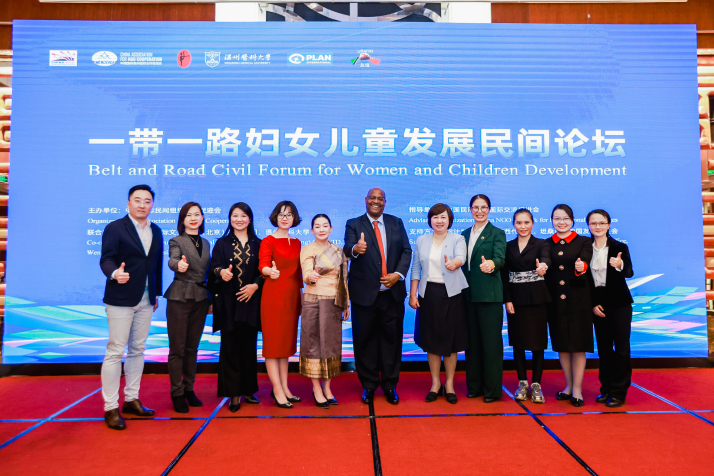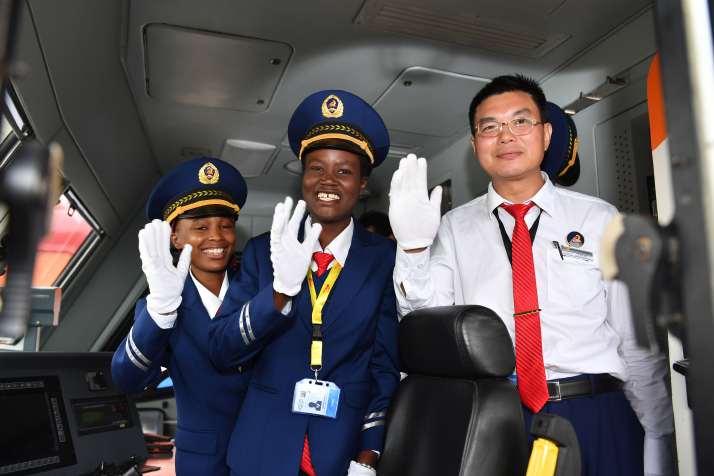| China |
| Paving the way | |
|
|
 Participants at the Belt and Road Civil Forum for Women and Children Development pose for a group photo in Beijing on October 20 (COURTESY PHOTO)
From birth to giving birth, every step can be a challenge for women in some developing countries. Even if they are blessed to be born healthy, receive basic education, and have enough food and water, many still face high mortality risk during pregnancy and labor and struggle in poverty to feed their babies. Employment is a luxury for many in this group. A number of nongovernmental organizations (NGOs) have, jointly or separately, worked to change the situation bit by bit. On October 20, some of these NGOs met in Beijing to share their experience at the Belt and Road Civil Forum for Women and Children's Development. Held by China Association for NGO Cooperation, over 300 representatives joined the forum both online and in-person. At the forum, Joseph Kulwa Kahama, Secretary General of Tanzania-China Friendship Promotion Association, gave a review of the decades of progress in improving lives of women and children in Africa since the beginning of the Belt and Road Initiative. "Women have benefited enormously in many aspects," he said. New mom, new babies Kahama was involved in initiating a midwifery training program in 2014, after he and his wife Nancy Kahama met their Chinese friend Dong Qixin in Tanzania. Dong is a businesswoman with a company based in Beijing. In response to Dong's question about the many unattended children on the street, Nancy said some of them were orphans, that the mothers of some had died in difficult deliveries, and that midwives are in great need in Africa. The couple asked whether Dong could organize a midwifery training course for Africa—not necessarily for high-level professional doctors. Midwives with basic skills can save many lives. The situation of maternal mortality in Africa is extremely severe and the death of women and newborn babies is tragically common due to a lack of professional care. Based on data from UNICEF, Sub-Saharan Africans suffer from the highest maternal mortality rate, with 546 maternal deaths per 100,000 live births, or 201,000 maternal deaths a year. Sub-Saharan Africa accounts for two thirds of all maternal deaths worldwide each year. The program was finally established in 2017 with full support from Wenzhou Medical University in Wenzhou, Zhejiang Province. Named Angel of Life, the first training was held in August 2018. It is an intensive two-week training session that delivers basic training on midwifery such as neonatal first aid and clinical practice. The program also offers classes introducing traditional Chinese medicine in midwifery and postpartum caring. Psychological intervention is also included in the training to help practitioners deal with problems such as postpartum depression. Most of the trainees are African students studying in colleges in China. So far, the program has delivered four sessions and trained over 200 students and nurses from Africa. "Traditional Chinese medicine has proved to be therapeutic in our practice," Sami Abdel Samad Nasef, Dean of the Faculty of Physical Therapy at the Egyptian Chinese University in Cairo, said at the forum. "It has largely relieved the pains of women during pregnancy and also helped, along with physical therapy, in treating postpartum depression. Facilities have also been improved to provide better medical conditions for local women in Africa. A maternity center that was put into operation at Makueni County, south Kenya, in 2021 has made receiving maternity care convenient for women in over 10 surrounding villages and towns. The center was built by China Energy Engineering Group Co. Ltd. Diao Chunhe, Executive President of the Alliance of Chinese Business in Africa for Social Responsibility, used this case as an example to illustrate corporate social responsibility as part of Belt and Road infrastructure construction. "Before the center was built, there were no separate wards for postpartum women, who received hardly any professional care," Diao said. "So far, the building has provided service to over 100 local women."  Concilia Owire (center) waves at the launch ceremony of the Chinese-built Mombasa-Nairobi Standard Gauge Railway in Kenya on May 31, 2017, together with colleagues. Owire, working at the line's operator, Africa Star Railway Operation Co., is one of the first female locomotive drivers in Kenya (XINHUA)
On track Over the past decade, a variety of training courses have been conducted to teach local women in Africa how to improve their living standards. In 2017, Kenyan train driver Concilia Owire was thrilled to be sitting in the driver's seat of a train in China. It was her first time driving a real train, a dream that she had had since childhood. Born in 1994, Owire didn't receive much support in chasing this dream in the beginning as it was considered to be a male-dominated field in Kenya. The young lady, though, proved her grit as a pioneer in this field with sharp skills and hard work. She completed a diploma in electrical and electronics engineering and a diploma course in locomotive and rolling stock engineering at the Railway Training Institute in Nairobi. In 2016, along with seven other women, she was selected by China Communica-tions Construction Company (CCCC) to be train operator trainees, receiving training in both Kenya and China through sponsorship from China Road and Bridge Corp., a CCCC subsidiary. In May 2017, Owire was chosen to be one of the main drivers for the inaugural trip on the Mombasa-Nairobi Standard Gauge Railway (SGR) in Kenya. Running 480 km between the capital Nairobi and the port city of Mombasa, it is the first modern railway to be built in Kenya since the country won independence in 1963. Owire was the first female train driver to drive on the modern track and Kenyan President Uhuru Kenyatta was one of her passengers on the trip. The status of female train drivers has evolved over recent years, with Owire's ability at work being highly praised. Now, the passengers, convinced by the abilities and hard work of female operators, give greetings and cheers for their work. Owire has now been promoted to a managerial position and a trainer for new drivers. As a role model in Kenya, she often visits schools and organizations, sharing her stories to students, especially girls, to inspire them to dream big and work hard to make their dreams come true. She says she owes her success to the opportunity provided by CCCC. "Otherwise, it would have been very difficult for me to have proven myself, even though I believed I could," she said. The training courses catering to the needs of local women in Africa have been bearing other fruits too. Juncao technology, the growing of fungi together with herbaceous plants, has won worldwide acclaim. Figures from a white paper released by the State Council Information Office in October show that Juncao technology is being applied in more than 100 countries, creating hundreds of thousands of green jobs for local youth and women. "Promoting gender equality and improving the wellbeing of women are the aims of many of our programs. In the future, we need to further stimulate women's potential and promote women's participation in development," Du Jie, Director of the Women's Studies Institute of China at All-China Women's Federation, said at the forum. Copyedited by G.P. Wilson Comments to yuanyuan@cicgamericas.com |
|
||||||||||||||||||||||||||||
|